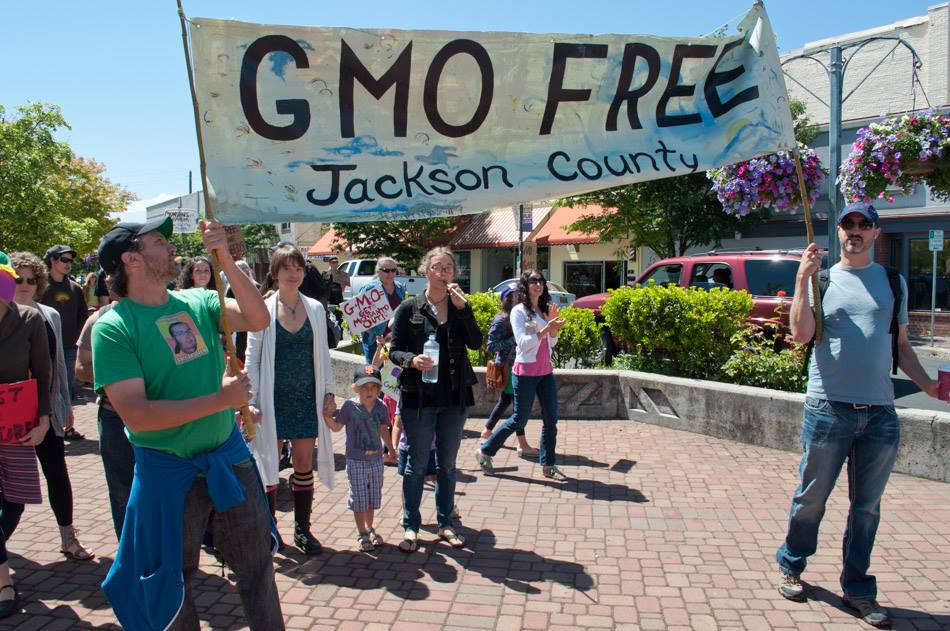GMO Ban Takes Effect in Jackson County

Jackson County’s first-in-Oregon GMO ban has taken effect.
Saturday was the first day people could alert county officials about violations of the ban on growing genetically altered crops.
But officials in the southwest Oregon county were not patrolling or making farmers destroy their plants — and it’s unclear if they ever will. More than a year after two-thirds of voters decided to oust GMOs, supporters and opponents alike are asking the same question:
Now what?
As it turns out, figuring out how to enforce the ban is more complicated than the election.
First, there’s the matter of a lawsuit.
A federal judge last week rejected a claim by farmers that the ordinance violated their “right to farm” under state law. Their claim that they should get $4.2 million in compensation from the county is still pending, however, and county officials agreed not to enforce the GMO ban until it’s resolved.
Shannon Armstrong, an attorney for the plaintiffs — Bruce Schulz of Gold Hill and James and Marilyn Frink of Sams Valley, who grow genetically altered alfalfa — wouldn’t say whether they plan to appeal.
Asked whether the farmers still have the alfalfa in the ground, she said only: “We’re still evaluating our options.”
George Kimbrell, senior attorney for the Center for Food Safety, a national group that fights GMOs, worked with the county in the case. He said he’s not aware of anyone else in the county growing GMO crops.
Syngenta, a Swiss biotechnology firm, used to lease test plots in the county for growing genetically modified sugar beet seed. But spokesman Paul Minehart said in an email that the company ended the tests and has no plans to return.
Proponents of the ban, however, argue that the ordinance remains valuable regardless of how much or little GMO farming is going on.
“The ban is definitely not just symbolic,” Kimbrell said. “The symbol of it is important, but it’s also creating geographical zones and protections for farmers to grow crops without genetically engineered contamination.”
In other words, he said, the ban sends a message to GMO farmers: Keep out.
That doesn’t mean everyone’s going to cooperate, though. Jackson County Farm Bureau President Ron Bjork estimates that about 2,000 to 3,000 acres in the county are used for GMO crops, primarily alfalfa and corn for animal feed.
“Those folks are not going to leave,” Bjork said. “You can’t tell if alfalfa is GMO just by looking at it. The county would have to go out and test it.”
Genetic engineering makes a big difference for alfalfa growers because the genetically modified version of the crop can be grown at double the volume, Bjork said.
He and Oregon Farm Bureau President Barry Bushue opposed the ban, which both argued was the result of non-GMO farmers’ unwillingness to co-exist.
Bushue called the measure “Draconian.”
“There was a lot of unnecessary hype and fear perpetuated by the whim of a few folks who decided some farmers are more important than others,” he said.
But those who crafted the ban said they’re just trying to protect their crops and seeds, which are vulnerable to GMO contamination in the narrow, windy Rogue Valley. Even a minuscule amount of GMO seed can render a non-GMO farmer’s crop unsalable, said Elise Higley, director of Our Family Farms Coalition, a Jackson County group that pushed for the ban.
“If GMOs stayed on the land they’re planted on, we wouldn’t be having this problem,” Higley said.
Seed growers and non-GMO farmers in Jackson County said they resorted to the initiative after Syngenta representatives refused to reveal the locations of their test plots and stopped coming to Southern Oregon Seedgrowers Association meetings.
County Administrator Danny Jordan said in an email that he stands by his estimate that the ban could cost as much as $200,000 a year for enforcement employees. He added that having to remove GMO contaminants from soil could cost millions of dollars.
In the meantime, he said, the county is racking up “significant” legal fees defending the ban in court.
The ordinance doesn’t require the county to enforce the ban; it just gives leaders the authority to do so. If the ban holds up in court, the county’s Board of Commissioners will have to decide how and whether to enforce it.
The ordinance also allows for third-party complaints. A resident who thinks someone in the area is growing GMO crops, for example, can send a letter asking the county to enforce the ban. If the county doesn’t act, the person can sue the grower.
State legislators have tried to enter the GMO debate in Jackson County with little success.
A bill that would have allowed farmers the right to sue for compensation or a waiver of land use statutes that hurt them financially, such as county GMO bans, died in committee last week.
“I viewed it as a way to say, if you’re gonna change direction and ban someone, you should at least pay them,” said Rep. Brian Clem, D-Salem, the sponsor. “If you don’t want to co-exist, buy the guy out.”
Non-GMO farmers fiercely opposed the bill because they said it discouraged government land-use regulations.
Source(s):
registerguard.com
Health Freedom Alliance
Health & Wellness Foundation
CHAD Foundation
http://www.healthfreedomalliance.org
http://www.healthfreedoms.org/gmo-ban-takes-effect-in-jackson-county/